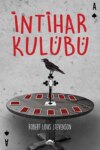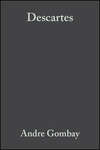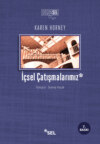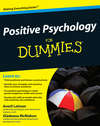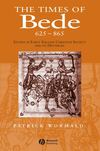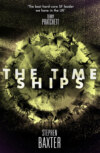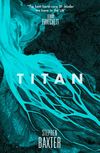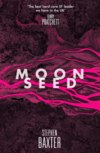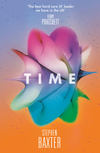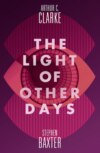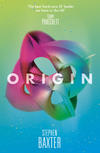Kitabı oku: «Phase Space»
STEPHEN BAXTER
PHASE SPACE
STORIES FROM THE MANIFOLD
AND ELSEWHERE


COPYRIGHT
Voyager an imprint of HarperCollinsPublishers Ltd 1 London Bridge Street London SE1 9GF
First published in Great Britain by HarperVoyager 2002
Copyright © Stephen Baxter 2002
Cover image of Calabi-yau manifold © Laguna Design/Getty Images
Cover layout design © HarperCollinsPublishers Ltd 2015
Stephen Baxter asserts the moral right to be identified as the author of this work.
A catalogue copy of this book is available from the British Library.
This novel is entirely a work of fiction. The names, characters and incidents portrayed in it are the work of the author’s imagination. Any resemblance to actual persons, living or dead, events or localities is entirely coincidental.
All rights reserved under International and Pan-American Copyright Conventions. By payment of the required fees, you have been granted the non-exclusive, non-transferable right to access and read the text of this e-book on screen. No part of this text may be reproduced, transmitted, down-loaded, decompiled, reverse engineered, or stored in or introduced into any information storage and retrieval system, in any form or by any means, whether electronic or mechanical, now known or hereinafter invented, without the express written permission of HarperCollins.
HarperCollinsPublishers has made every reasonable effort to ensure that any picture content and written content in this ebook has been included or removed in accordance with the contractual and technological constraints in operation at the time of publication.
Source ISBN: 9780008134501
Ebook Edition © JUNE 2012 ISBN: 9780007387335
Version: 2015-09-02
CONTENTS
Cover
Title Page
Copyright
Prologue
DREAMS (I)
Moon-Calf
EARTHS
Open Loops
Glass Earth, Inc.
Poyekhali 3201
Dante Dreams
War Birds
WORLDS
Sun-Drenched
Martian Autumn
Sun God
Sun-Cloud
MANIFOLD
Sheena 5
The Fubar Suit
Grey Earth
Huddle
PARADOX
Refugium
Lost Continent
Tracks
Lines of Longitude
Barrier
Marginalia
The We Who Sing
The Gravity Mine
Spindrift
Touching Centauri
DREAMS (II)
The Twelfth Album
Afterword
Keep Reading
Acknowledgements
About the Author
Also by the Author
About the Publisher
PROLOGUE
Kate Manzoni, with Reid Malenfant and Cornelius Taine, stood on Mike’s porch. Inside the house, the baby was crying. Baby Michael – son of Mike – Malenfant’s grandson.
And in the murky Houston sky, new Moons and Earths burst like silent fireworks, glowing blue or red or yellow, each lit by the light of its own out-of-view sun.
It was just seven days since the failed echo from Alpha Centauri.
Malenfant said, ‘So what are we looking at?’
‘Phase space.’ Cornelius seemed coldly excited. ‘The phase space of a system is the set of all conceivable states of that system. We’re glimpsing the wider phase space of the universe, Malenfant.’
Kate wondered how that remark helped.
No traffic moved on the street. Everybody had gone home, or anyhow found a place to hunker down, until –
Well, until what, Kate? As she had followed this gruesome step-by-step process from the beginning, she had studiously avoided thinking about its eventual outcome: when the wave of unreality, or whatever it was, came washing at last over Earth, over her. It was unimaginable – even more so than her own death. At least after her death she wouldn’t know about it; would even that be true after this?
Now there were firebursts in the sky. Human fire.
‘Nukes,’ Malenfant said softly. ‘We’re fighting back, by God. Well, what else is there to do but try? God bless America.’
Saranne snapped, ‘Come back in and close the damn door.’
The three of them filed meekly inside. Saranne, clutching her baby, stalked around the house’s big living room, pulling curtains, as if that would shut it all out. But Kate didn’t blame her; it was an understandable human impulse.
Malenfant threw a light switch. It didn’t work.
Mike came in from the kitchen. ‘No water, no power.’ He shrugged. ‘I guess that’s it.’ He moved around the room, setting candles on tables and the fire hearth; their glow was oddly comforting. The living room was littered with pails of water, cans of food. It was as if they were laying up for a snowstorm, Kate thought.
Malenfant said, ‘What about the softscreens?’
Mike said, ‘Last time I looked, all there was to see was a loop of the President’s last message. The one about playing with your children, not letting them be afraid. Try again if you want.’
Nobody had the heart.
The light that flickered around the edges of the curtains seemed to be growing more gaudy.
‘Kind of quiet,’ Mike said. ‘Without the traffic noise –’
The ground shuddered, like a quake, like a carpet being yanked from under them.
Saranne clutched her baby, laden with its useless immortality, and turned on Cornelius. ‘All this from your damn fool stunt. Why couldn’t you leave well enough alone? We were fine as we were, without all this. You had no right – no right …’
‘Hush.’ Malenfant moved quickly to her, and put an arm around her shuddering shoulders. ‘It’s okay, honey.’ He drew her to the centre of the room and sat with her and the infant on the carpet. He beckoned to the others. ‘We should hold onto each other.’
Mike seized on this eagerly. ‘Yes. Maybe what you touch stays real – you think?’
They sat in a loose ring. Kate found herself between Malenfant and Saranne. Saranne’s hand was moist, Malenfant’s as dry as a bone: that astronaut training, she supposed.
‘Seven days,’ Malenfant said. ‘Seven days to unmake the world. Kind of Biblical.’
‘A pleasing symmetry,’ Cornelius said. His voice cracked.
The candles blew out, all at once. The light beyond the curtains was growing brighter, shifting quickly, slithering like oil.
The baby stopped crying.
‘Hold my hand, Malenfant,’ Kate whispered.
‘It’s okay –’
‘Just hold my hand.’
DREAMS (I)
MOON-CALF
This time they have a couple of hours to spare before the bookstore signing, so Jays and Alice check into their hotel, and take a walk.
Hereford turns out to be a small, picturesque little town like so many crowded into England. It is incredible to Jays that they are only a hundred thirty miles west of London, and yet they’ve already all but come out of England into Wales. The centre is pretty, with a lot of historical curiosities, some of them incredibly old – ‘Nell Gwynne was born here,’ Alice points out, ‘I thought she was a character from a novel’ – but it is a little clogged with traffic.
The older houses are built of old red sandstone, Jays recognizes.
They walk along a river called the Wye. It is a steamy June afternoon – today, in fact, is the longest day of the year – with the sky a high, pale blue dome, and the reflection of the cathedral shines in the water. But the river is running low, and the willows are having trouble dipping to the water surface, and the grass sward is long and yellow, for England is suffering another of its baked-dry summers. The climate is changing here, with Mediterranean weather patterns working their way up from southern Europe. But, Jays remembers, England always looked pale brown or grey, not green, from orbit.
At around five, they walk into the cathedral. A choir of schoolboys is practising, and their thin, delicate voices float on the air. There are tourists here, but they move around quietly, looking up. Jays is conscious of the loud click of the toecaps of his boots on the flags.
Alice reads from a guide pamphlet. ‘“The cathedral is mainly Norman.” Some of it is nine hundred years old, Jays. “Of special interest are the carved stalls, the fourteenth-century Mappa Mundi in the south transept, the chapels, the tombs and the library, with its chained and rare books.”’ She sniffs. ‘I’m becoming acclimatized to all this great age, I think.’
Jays runs a hand over a huge slab of sandstone embedded in a pillar. Somebody has carved a graffito here – ‘Dom. Gonsales’ – but even this desecration is self-evidently ancient.
‘Nice rock?’ Alice asks dryly.
Jays grins as they walk on. ‘Actually, yes. This is Devonian sandstone –’
‘Don’t tell me. When dinosaurs ruled the Earth.’
‘Hell, no. Much older than that. This stuff is about four hundred million years old, Alice. We’re on the coast of the Old Red Sandstone Continent. The rock here was laid down in lakes and deltas; most of southern England was covered by ocean. There were plants on land, but no animals yet …’
She nods as if listening, but she has found a small book stall, and is starting to browse.
Jays scratches the frosting of white that is all that is left of his hair. He is now seventy years old, fit and California-tanned. For twenty-five years, since his Apollo flight, his one and only spaceflight, he has been a bore about the Moon. And now his interest in geology is making him a bore about the Earth, too.
It is kind of heroic, he thinks, to be dull on two planets.
Alone, he wanders a little further. He tries to fix the church in his memory.
Most of the great English cathedrals stopped developing during the Reformation in the sixteenth century, when Henry VIII took his country away from the Church of Rome. Compared to the great churches in Catholic countries like Spain or Italy, swamped by centuries of ornamentation, English cathedrals have a certain austere class, he has decided.
He comes to a small, rather ugly side chapel. It isn’t roped off, but there are no tourists here. The walls are much darker than the rest of the church, and that, together with the filtering of the light by a couple of niggardly slit-windows, adds to a sense of gloom and age.
Jays, on impulse, steps inside. There are a couple of pews before a small, nondescript altar, and a stand of unlit candles. There is dust on the pews. A paper sign, stuck to the wall with putty, tells him this is Bishop Godwin’s Chapel, XVII Century. So this chapel is older than his nation. The windows are filled with panes of stained glass, which show what look, oddly, like Chinese scenes.
He runs his hand over the wall. Maybe the dark coloration is candle black, he thinks. But his fingers come away clean, save for a little dust.
He decides to apply a little geology. It looks more like an igneous or metamorphic rock than a sedimentary, like a sandstone. It is dark and isn’t coarse-grained, so that makes it a basalt. And there are fine gas bubbles embedded in the surface. A vesicular basalt, then, a lava that has cooled on the surface of the Earth.
He looks around. The chapel’s walls are all constructed of the dark basalt.
A lava, here in the heart of Britain?
He looks around, but there is no leaflet to explain the chapel’s history, nor anybody to ask about it.
Alice is still in the bookshop, leafing through a pamphlet.
‘Hell of a thing,’ he says.
She smiles abstractedly. ‘Look at this. It’s about you.’ She passes him the little book.
It is called The Man In The Moone, or a Discourse of a Voyage Thither by Domingo Gonsales, the Speedy Messenger.
The story is about how a man called Gonsales trains swans to carry him through the air. Twenty-five of them, each attached to a pulley, save him from a shipwreck. But the swans hibernate on the Moon, and carry Gonsales there …
And so on. It is a seventeenth-century tale, he sees, reprinted by some local enthusiast. The kind of stuff they now call proto-science fiction.
Domingo Gonsales. He tells her about the graffito he saw.
She takes the book back. ‘Maybe it was a fan. Or a literary critic. What did you want to tell me?’
He describes the lava walls to her. ‘It’s just it doesn’t make any sense, geologically.’
She pulls a face. ‘Geology,’ she says. She has a broad, high-cheekboned face, highlighted blond hair and intense blue eyes. At forty-five, she still turns heads. In a way he is glad she is getting a little older. It makes him less open to the accusation that he’s picked up a trophy wife, after Mary dumped him. And Alice has turned out to be one hell of a PA and agent, as his modest literary career has taken off.
‘Remember what I told you. You can tell the geology of an area just by looking at the old buildings there …’
Once, most of Britain was covered by a shallow ocean, which deposited gigantic chalk layers. But then Britain tipped up, and the ice came, scraping most of the chalk off the top half of the island. Now, as you travel south from Scotland, you traverse younger and younger landscapes: billion-year-old gabbros and granites and basalts in Scotland, belts of successively younger sedimentaries as you come down through England, until you reach the youngest of all, the marine Pleistocene clays and sands around London, less than sixty million years old.
His signing tour has taken in Aberdeen, Edinburgh, Preston, Manchester, Birmingham, Peterborough, as well as London. He’s insisted on taking a train or a hired car everywhere, never flying, so he could see the old buildings – churches, houses, pubs, even railway stations – which stand like geological markers, constructed of the native rock.
‘Anyhow that’s why the basalt in that chapel is so odd,’ he says.
‘If it is basalt.’
‘Sure it is. Come on, Mary; I know basalts. All the damn Moon rocks we picked up were basalts. It’s just unusual for such an old building to feature such displaced materials. They didn’t have the haulage capability we have now …’
She shrugs. ‘They built Stonehenge from that rock from Wales, and that’s a lot older. It’s just a few tons of some Scottish stone.’
‘But what the hell’s it doing here, in the Godwin Chapel?’
‘Godwin?’ She frowns at that, and looks again at the book she is holding. According to the jacket The Man In The Moone was written by Francis Godwin, Bishop of Hereford, in the seventeenth century. ‘How about that,’ she says. ‘You suppose it is the same guy?’
He shrugs. ‘We could check.’
She reaches for her purse. ‘Anyhow this settles it. I thought nine pounds is a little steep for forty-three pages, but I guess this book has been waiting here for us to find it.’
She pays for the book, and he wants to go back to the chapel, but there is no time left before the signing.
So, Colonel Holland, why ‘Jays’?
It is a question he’s answered a hundred times before, but what the hell. ‘It was my sister. When she was a kid she couldn’t say “James” right. It came out “Jays”. It stuck as a nickname.’
Is it true you changed your name by deed poll to Jays?
‘No. And it’s not true I trademarked it, either …’
Laughter.
The little lecture room in back of the book store is maybe half-full, rows of faces turned to him like miniature moons, filled with pleasant interest. He decides he is going to enjoy the event, even if he feels intimidated by the giant show cards his publisher has sent over from London – ‘Rocky Worlds – A Vision of the Future by a Man Who’s Been There …’
Why the title?
‘Something that occurred to me on the Moon,’ he says. ‘Maybe Earth is unique. But the Moon isn’t, even in our solar system. The Galaxy has got to be full of small, rocky, airless worlds like the Moon. Right? I was only a quarter million miles from Earth, but if I looked away from Charlie and the LM, away from the Earth, if I shielded my eyes so I could see some stars, I could have been anywhere in the Galaxy – hell, anywhere in the universe …’
The audience move, subtly, showing he has hit the wonder nerve. Even though he’s cheating a little. He had no time for such reflection on the Moon; such insights have come from polishing those memories in his head like jewels, until he can’t tell any more what was fresh observation on the Moon, or the maundering of an old man.
Sitting here, his hands flapping like birds in front of him in his nervousness, he knows how he comes across: he is a retiring, almost inarticulate man – hell, he is just a pilot after all – who has been thrust forward by history, and has made himself articulate.
Your books are full of geology. But you weren’t trained in geology for your Apollo flight.
That isn’t quite true. They had some training from geologists attached to the project – they’d be taken to Meteor Crater, Arizona, or some such place, and told to look – they had to try to be geologists, at least by proxy, in a wilderness no true scientist had ever trodden, and maybe never would.
But in the end it came down to completing the checklist, and wrestling with unexpectedly balky equipment, and anyhow the LM put them down on a mare which turned out to be a dull lava plain …
… a plain that shone, tan brown and grey, beneath a black sky, with a surface that crunched beneath his feet like fresh snow, rock flour impact-shattered by three billion years of bombardment, pocked with craters of all sizes from yards across to pinpricks, and he remembers how he pushed his fingers into the surface, monkey fingers swathed in white pressure-suit gloves, but he came up against stiff resistance a few inches in where the impacts tamped down the regolith to a greater density than any compacting machine could achieve, and when he pulled out his hand his glove was stained coal black …
But such moments were rare, as he spent three days bouncing across that bright, sandy surface with his commander in the Lunar Rover, wisecracking and whistling and cussing; for the point of the journey was not the science of the Moon, of course, nor even the political stuff that pushed them so far, but simply to get through the flight with a completed checklist and without a screw-up, so you were in line for another …
But for him, there never had been another. After returning home he was caught up in the PR hoopla, stuff he’d hated, stuff that led him to drink a hell of a lot more than he should. And by the time he’d come out of that he found himself without a wife and out of NASA, and too old to go back to the Air Force.
It was a time he thinks of as his Dark Age.
But he kept in touch with the studies of the Moon rocks he brought back. It prodded in Jays a lingering interest in geology. He took a couple of night classes, and has done a few field trips. For a while it was just a way to fill up time between Amex commercials and daytime talk shows, but he has soon come to know a lot more about his home planet than he ever did about the lonely little world he, and only eleven other guys in all history, have visited. Hell of a thing.
And, gradually, the geology stuff has hooked his imagination.
Death Valley, for instance: if you manage to look beyond the tourist stuff about bauxite miners and mule trains, what you have there is a freshwater lake, teeming with wildlife and flora, that has gotten cut off from the sea. Over twenty thousand years the lake dwindles and becomes more and more saline; the trees and bushes die off and the topsoil washes away, exposing the bedrock, and the lakes’ inhabitants are forced to adapt to the salt or die …
His first short story is slight, a tale of a human tribe struggling to survive on the edge of such a lake.
Nods, from the sf enthusiasts in the audience. ‘The Drying’.
It sold for a couple hundred bucks to one of the science-fiction magazines, he suspects for curiosity over his name alone. A novel, painfully tapped into a primitive word processor, followed soon after. He hadn’t read sf since he was a kid, and now he rediscovered that sense of time and space as a huge, pitiless landscape that impelled him towards space in the first place.
A couple of books later his sales dwindled, when the celebrity angle wore off. But then they started to pick up again, and he is pleased with that, because he suspects people are starting to buy his fiction for itself, not because of him.
He doesn’t say all this to his audience, however. But they probably know it. His life is a matter of public record, after all.
Are you arguing for a return to space, in your books?
‘I guess so. I think we need to be out there. You don’t need to know much geology to see that … In a few thousand years the ice will be back, scraping the whole damn place down to the bedrock again, and I don’t know how we’re proposing to cope with that. And then there are other hazards, further out …’
The next big rock. The dinosaur killer.
‘It’s on its way, maybe wandering in from the Belt right now, with all our names written on it … But I’m not propagandizing here. This is just fiction, right? I want your beer money, not your vote.’
Laughter.
Do you feel bitter about the big shut-down that happened after Apollo? Do you blame the Confucians, or the eunuchs?
That question, from a little guy in a battered anorak, throws him. But he remembers that odd Chinese-looking design in the stained glass in that peculiar chapel, and he wants to pursue the point. But the little guy starts to lecture about the Ming Dynasty, and the bookstore owner moves them on.
After an hour or so, the owner winds up the q-and-a. He signs maybe a dozen copies of the new book, and some stock, and a couple of battered paperback editions of the older stuff.
Before dinner, the store owner takes them to a pub called the Wellsian. ‘I thought you’d like to see this …’ Bizarrely, it is an H.G. Wells theme pub, with mock-ups of the Hollywood Time Machine and Martian tripods stuck over vaguely Victorian decor. There is a bar menu which, though containing the usual bland rubber-chicken options, nevertheless has each dish referenced to Wells: ‘H.G. Tagliatelle’, or ‘Herbert George’s Chicken Kiev’, and so on.
He has his picture taken under an engraved line from First Men In The Moon, about a Moon-calf – a word which, the bookstore guy tells him, is actually an old English word meaning something like blockhead, and which gives him an opportunity for more gentle joshing.
Alice seems to be trying not to laugh. ‘It’s the weirdest place I’ve ever seen,’ she says. ‘H.G. Wells had nothing to do with Hereford.’
‘Nor does basalt.’
Jays accepts a diet soda. The little guy from the q-and-a, who’d talked about China, is here, cradling a pint of some flat English beer. His name, it turns out, is Percy, he is aged maybe fifty, and he works with the Cathedral’s collection of rare books. His clothes have a vaguely musty smell, not necessarily unpleasant. When he speaks his voice is something of a bray, and the other locals tend to look away and change the subject; he is evidently something of a local eccentric.
Nevertheless he isn’t bugging Jays, and he seems to know all about China. Jays lets him open up about his eunuch reference.
Once, says Percy, the Chinese led the world in technology: they had printing, gunpowder, the compass, in some cases centuries before Europe. At the time of the early Ming Dynasty, in the early fifteenth century, they even went exploring.
They built fifteen-hundred-ton ‘treasure ships’, each big enough to carry five hundred men. Chinese explorers rounded southern Asia to Bengal, Ceylon and even reached the east coast of Africa in 1420, prefiguring the Portuguese expeditions by fifty years. The ships brought home exotic novelties – people, animals, plants – and struck terror wherever they landed.
‘The great voyages were led by Admiral Zheng-Ho,’ says Percy, ‘who was a eunuch. But in 1436 a new emperor came to the throne, called Zheng Dung. He cut the building of ships, the construction of armaments and so forth. The Navy fell apart, and China was isolated from the rest of the world, until the barbarians from Europe came sailing up four centuries later. There are obvious resonances for our times –’
‘Yeah,’ growls Jays.
‘The cause of it all was conflict between the Confucian scholars who ran the imperial bureaucracy, and the Grand Eunuchs of the Imperial Court. The eunuchs’ voyages were seen as a threat to the bureaucracy. But the Confucians were in charge of educating the emperor and they had played a long game. They had convinced the young Zheng Dung that China was self-sufficient, and didn’t need to deal with the barbarian lands at its rim. So they blocked technological development, to maintain their feudal power …’
Some of the other fans, sensing the implicit approval Jays is bestowing on Percy, are edging closer. They start to speculate, as Jays has learned fans will do, about what-if parallel universes in which the Chinese kept going. Perhaps Francis Drake would have faced an Armada of Chinese treasure-ships. Perhaps Zheng-Ho might have reached America before Columbus. And so on.
Jays asks Percy what happened to Zheng-Ho. He shrugs, almost spilling the beer he has barely sipped. ‘There are stories that he went off to the hinterland and tried to keep exploring, with technologies out of the grasp of the bureaucrats. China is a big country, after all; there was room for such things. And room for a lot of legends. Zheng had followers, who are supposed to have kept up the work after his death, until the Confucians closed them down. It’s probably all apocryphal. Man-carrying rockets, for instance.’
There is general laughter at this, and there is more speculative chatter about a Chinese space programme of the fifteenth or sixteenth centuries.
Jays is reminded of what he once knew of the history of rocketry. The Chinese developed the first rockets around the year 1000 A.D., under the Sung Dynasty: the versions that leaked to Europe via the usual trade routes were just crude affairs, gunpowder-filled bamboo or pasteboard tubes with little power and unpredictable trajectories … Still, reflects Jays, in the heart of China, there might have been five centuries of development of this technology by Zheng-Ho’s day.
There is also, it seems, a Chinese legend local to Hereford: of a sixteenth-century traveller from Spain who came here with what sounds like a goods caravan, laden with exotic jewellery and herbs, all, he claimed, from the heart of mysterious Cathay.
Oddly, he also brings rocks.
The tale is recorded in the Godwin Chapel’s stained-glass window. And some of the locals remember the incident by keeping up an old tradition of a festival held on the fifteenth of August, celebrating the day a Chinese goddess was supposed to drink a magic elixir and fly to the Moon. There are invitations for Jays to come back on the fifteenth of August, a couple of months away.
Alice has finished her white-wine spritzer, and is discreetly plucking at his sleeve.
They make their farewells and apologies, and escape into the cooling air of the evening.
In the pub garden, a wood-fire barbecue is burning, wood to make this cultural import seem more traditionally English, he guesses. The smell of the wood takes him right back, across twenty-five years …
… after the first Moonwalk, when the oxygen had rushed back into the aluminium balloon that was the LM’s cabin, and both of them were covered in grime, when Charlie took off his helmet, and Jays took a picture of his smiling, lined, bearded face, and then of the area outside, the flag and equipment and the parked Rover and footprints everywhere, footprints that might last a million years, and when he took his own helmet off, there was a pungent smell, the odour of wood-smoke, or maybe of gunpowder: it is the smell of Moondust, slow-burning in oxygen from Earth …
But it is time for dinner with the publisher’s rep, and they walk on.
In bed, Jays glances through the Godwin book. It is a comedy – he guesses – lacking the gloss of modern science fiction. But some of the ideas seem reasonably sophisticated, for its time. The good Bishop was a little mixed up about the size of the stars, but his universe was Copernican – with the planets circling the sun – and he got gravity more or less right, with references to different gravity on the Earth and Moon, weightlessness between worlds, and the problems of re-entry to Earth’s atmosphere.
Jays has read, or rather discarded, some modern hard sf which contains worse bloopers.
He describes all this to Alice. ‘It’s hardly a traveller’s guide,’ he says, ‘but –’
She takes the book from him and kisses him on the cheek. ‘You’re very sweet, but very transparent. You’d love it to be true, wouldn’t you?’
‘What?’
‘I could see what you were thinking, in that ridiculous pub. Maybe the Chinese went to the Moon, in the fifteenth century. Maybe the story somehow reached England – here, Hereford – perhaps through the traveller they talked about.’
‘And maybe Bishop Godwin wrote it up.’
She leafs through the book. ‘But why not just tell the story straight? Why all this stuff about swans? Why not just write about the Chinese admiral and his rockets?’


